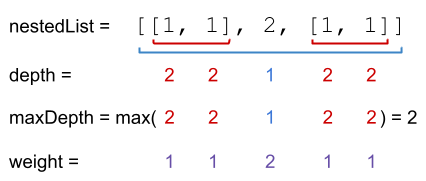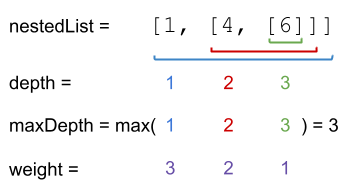You are given a nested list of integers
nestedList. Each element is either an integer or a list whose elements may also be integers or other lists.The depth of an integer is the number of lists that it is inside of. For example, the nested list
[1,[2,2],[[3],2],1] has each integer’s value set to its depth. Let maxDepth be the maximum depth of any integer.The weight of an integer is
maxDepth - (the depth of the integer) + 1.Return the sum of each integer in
nestedList multiplied by its weight.Example 1:

Input: nestedList = [[1,1],2,[1,1]]
Output: 8
Explanation: Four 1’s with a weight of 1, one 2 with a weight of 2.
11 + 11 + 22 + 11 + 11 = 8
Example 2:

Input: nestedList = [1,[4,[6]]]
Output: 17
Explanation: One 1 at depth 3, one 4 at depth 2, and one 6 at depth 1.
13 + 42 + 61 = 17
Constraints:
1 <= nestedList.length <= 50
The values of the integers in the nested list is in the range [-100, 100].The maximum *depth of any integer is less than or equal to
50.题目大意:
求NestedInteger的和。越浅,权重越高
解题思路:
BFS按层遍历。此题类似于LeetCode 339 Nested List Weight Sum。归纳成更一般的方法:因为权重只与第几层有关。所以先求每一层的和,存到sums里面,再按照题目要求每个和乘以相应的权重求和。
Nested List题目:
LeetCode 341 Flatten Nested List Iterator Iterator - Stack
LeetCode 339 Nested List Weight Sum - BFS
LeetCode 364 Nested List Weight Sum II - BFS
解题步骤:
N/A
注意事项:
- queue.extend(node.getList())将节点的儿子节点即node.getList()放入queue
Python代码:
1 | def depthSumInverse(self, nestedList) -> int: |
算法分析:
时间复杂度为O(n),空间复杂度O(k), k为每层最多节点数 + 最大层数



